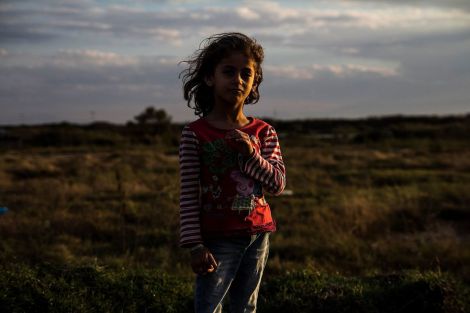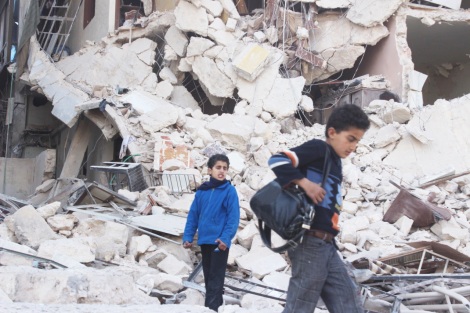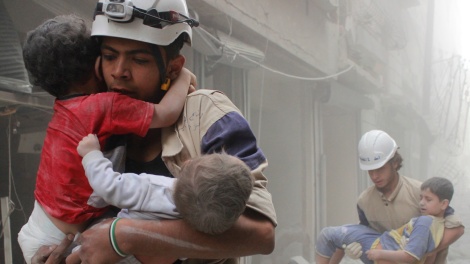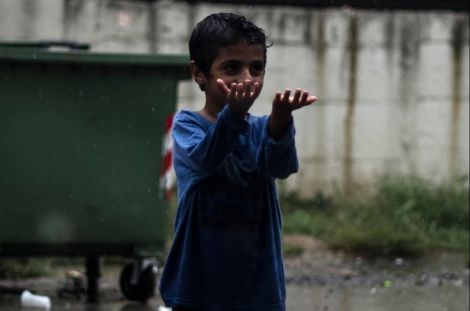
Directed by: Evgeny Afineevsky
Narration by: Helen Mirren
Featuring: Hadi Al Abdullah, Raed Al Saleh, Riad Al-Asaad, Bashar al-Assad
Produced by: Evgeny Afineevsky, Aaron I. Butler, Den Tolmor
Executive Produced by: Lara Alameddine, David Dinerstein, Daniel Dubiecki, Sheila Nevins
Music by: Martin Tillman
Cinematography by: Evgeny Afineevsky, Monzer Al Hallak, Mahmoud Al Saadi, Samir Al-Mutfi, Faris Al-Shawaf, Mohamad Aljunde, Moaz AlShami, Mustafa Anas, Ahmed Barakat, Alaa Break, Khaled Eissa, Tamer Eker, Raed Fares, Mustafa Kanli, Sultan Kitaz, Yaman Marwah
Editing by: Aaron I. Butler
Official Selection of the 2017 Sundance Film Festival
*****
“I will go, I will go, I will go
And in war’s waters, I will wade
And I will know if I remorse or regret
The fairness of our trade
For you to live, I took your place
A deal was made and I was paid
And the goal as I was told
Was a place where my body could be laid.”
-Wilco

*****
One thing I remember about reading Roger Ebert’s reviews when he was still alive was how often he saw a film that he knew would be too troubling or painful for him to watch again. I have always felt the same way after seeing particularly affecting movies, but have sometimes been sucked back into a casual watch of one or two of the movies that I considered “un-rewatchable.” With fiction, this becomes easier: movies like 12 Years a Slave or Blue Valentine, both of which I lump into this category, require multiple viewings for their artistic accomplishments to be “fully” grasped.
But watching documentaries like Joshua Oppenheimer’s The Act of Killing, a disgusting, incredible movie, or Shoah, an 8-hour marathon of guilty attentiveness, presents a different kind of challenge. You are not allowed to look away for fear of missing important historical information, materials that you should have if you want to become a true citizen of the world. Even an overblown drama like Blackfish stuns you into submission with its hostile realities.

Cries from Syria, the new film from HBO and director/producer Evgeny Afineevsky, falls squarely between documentary melodrama and the epic-scale miserablism of works like Lanzmann’s or Oppenheimer’s. In the hands of another filmmaking team, the subject of contemporary Syria and its ongoing Civil War could have been told in an “Intro to Human Rights Violations” that would both disrespect and damage its importance. So it gives me some painful pride to tell you with as much authority as I can muster that I will never watch it another time in my life if it can be helped. It is simply that powerful.
Afineevsky and editor Aaron I. Butler spin a historical tale of national abuse as old as time. Following the Arab Spring, the fall of regimes in Libya, Tunisia, and Egypt, and the widespread disintegration of the Middle Eastern unity narrative, Syria emerged as arguably the most damaged and desperate nation in the region. President Bashar al-Assad gets a majority of the blame here, first by maliciously antagonizing and ultimately by carpet-bombing his own electorate as their protests turn to riots, riots to complete mania, and mania to anti-government warfare.

The filmmakers show how international “allies” helped the authoritarian Assad regime to stage massive, falsely-motivated murder of its citizenry and public destruction of even Syria’s most treasured domestic cities: Damascus, Homs, and notoriously this last year, Aleppo. No source is singularly accused of the genocidal abuses perpetrated on the people in the course of the war – it is enough for Afineevsky to suggest that the relationship (as Oppenheimer did so magisterially in his Indonesian diptych) between Russian, American, and domestic government is what cultivated such a steady stream of destruction.
The key to this film’s palatability (a word which I use generously, as this is not to be watched by casual channel-flippers) is its wide-eyed acceptance of imagery that we image-obsessed Western viewers try hard to avoid. Human rights workers, like the famous White Helmets, get crushed by tons of concrete; children wash up on beaches drowned to death; and people get riddled with bullets, all in the name of “combating terrorism” in the homeland. But these images are far from salacious; in fact, Butler is so respectful (or perhaps self-censoring) as to cut away before an on-camera beheading.
The message in these shots seems to be that even journalists have to draw a line somewhere. Afineevsky relies heavily on the words and presence of Syria’s citizen journalists, like Hadi Al Abdullah and Kholoud Helmi, to concretize the contemporary realities within the country. In the first and least successful act of the film, their recollections drive a somewhat patronizing instructional voice that even Butler’s swift editing cannot conceal.

Then, as the journalists and the children of Syria emerge as heroic victims of their own fearless behavior in the second act, the filmmakers allow both groups to comment on their own metanarrative involvement in Syrian history. This works here better than in many report-driven docs, in part because the characters with whom we spend the most time lack composure (they weep wildly, they scream at the camera, etc.) or suffer direct injury themselves (Abdullah has both his legs broken in a bombing which we see.) Of course, kids are the only surefire way to make strangers like us cry.
Butler, who received a Producer credit here as well, does such extraordinary work weaving their shared experiences into a tapestry of pain that we breathe deeply when they begin discussing relief efforts by the White Helmets and Doctors Without Borders. It is a short twenty minutes of triumphal footage, and largely unconvincing, but it is just enough of a tonic to squeeze the viewer through to the finish line. Afineevsky’s major achievement is his discovery of an aesthetic formula for making devastating atrocity watchable without making it appealing.
With more than a dozen cinematographers and producers credited, this film is primarily a bricolage of tragic experience, with all the various photographic and video formats and their respective visual qualities left as-is. As the picture comes to an end, we sense that it was assembled by committee – typically an insult in Hollywood formula, but here, an almost utopian ideal of connected filmmaking.
A challenge remains, though, which is to espy Afineevsky himself within the narrative construction of Cries from Syria. The militant verite of his previous film, 2016’s Winter on Fire: Ukraine’s Fight for Freedom resulted in an Oscar nomination for Best Documentary.
That film’s visual aggression is suspended here for a less kinetic and far more dialogic, slower pace. While it suits the nature of Syria’s unending, epic conflict, there are fewer direct parallels to the director’s most famous work than one might expect.
It is true that he has a humanist’s bravery for venturing into conflict zones with both strategic deployment of the camera (it is just as important to know when not to use the camera as to run into a battle zone) and a master photographer’s sense for emotional imagery.
Yet Afineevsky never appears on camera nor lets his interviews appear in full onscreen, forsaking his own personage for more “verisimilitude” or “authenticity” in the narrative. Knowing his skill behind the camera, this feels like a great loss, and HBO – typically so auteur-friendly – will disappoint its art-house audience, I predict, when the film premieres on March 13, 2017 by not exploring the filmmaker’s own role with more complexity.
